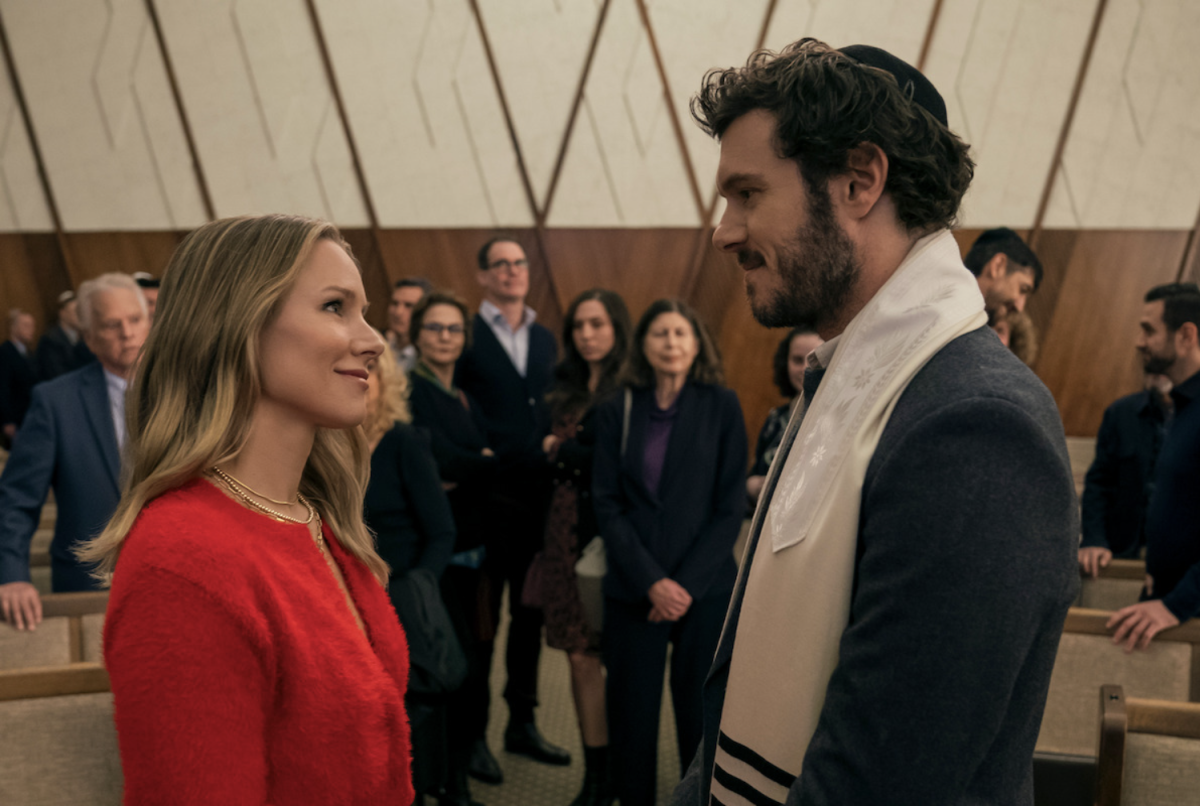Warning: This review contains spoilers.
I don’t really watch TV, but when my 84-year-old grandfather called me to tell me to watch “Nobody Wants This,” I figured I should listen. I ended up starting and finishing the show in one day while home for the Jewish High Holidays, much to the delight of my family.
“Nobody Wants This” was released on Netflix less than three weeks ago, and it has already been renewed for a second season. The show, which currently holds the No. 2 spot on the streaming service’s most-watched list, follows the blooming romance between Rabbi Noah (Adam Brody) and agnostic sex podcaster Joanne (Kristen Bell). The two meet at a party in the first episode, and are quickly smitten with one another.
However, there’s one problem with their romance: Joanne is a shiksa. As Noah and his brother Sasha (Timothy Simons) explain to Joanne and her sister Morgan (Justine Lupe), that means she is “a hot, blonde non-Jew.”
The unconventional relationship between Noah and Joanne is one contemporary example of the centuries-old conflict of interfaith marriage, which is common in many religions. This specific ambivalence toward such marriages is due to a multitude of reasons, ranging from biblical ideals to the aftermath of the Holocaust.
Interfaith marriages may be more common now than in the past — I am the offspring of one, after all — but they are still a hurdle that many couples face. It is made especially more difficult when one half of the couple is a rabbi, who is expected to not only teach, but strictly follow, Jewish law.
It is clear from the start that Noah’s community will have some gripes with him dating a non-Jew. In the first episode, Noah ends his relationship with the ideal Jewish daughter-in-law Rebecca (Emily Arlook), right before meeting Joanne. When Joanne shows up to Noah’s synagogue to watch his Friday night sermon, a crowd of irate community members — most of whom want to date Noah — watch their interaction, with the group moving in slow motion toward the couple. Rebecca’s best friend and Sasha’s wife, Esther (Jackie Tohn), asks “Who the hell is that?” to which Noah’s mother Bina (Tovah Feldshuh) angrily responds “a shiksa!” before the screen cuts to black, dramatically closing off the first episode.
The rest of the season follows the star-crossed lovers as they try to make it work. The two quickly fall in love, despite Esther and Bina’s close-minded snarky attitude toward Joanne, Morgan’s difficulty accepting the relationship and plenty of awkward interactions with each other’s families. The true obstacle comes when Noah finds out he is in line to become head rabbi at his synagogue, which means he and Joanne would need to break up, she would have to convert or he would have to quit his job to stay with her. Viewers are left on an intense cliffhanger, leaving us eagerly anticipating the next season.
“Nobody Wants This” totally feeds into Jewish American stereotypes, but I can vouch for their validity. While incredibly overdone and melodramatic for comedic effect, the show is not offensive, but rather quite heartwarming. It reminded me somewhat of my own family.
“It’s an exaggeration of stereotypes that are really based in fact,” said my grandmother, a proudly self-proclaimed Jewish mother.
After Bina finishes pestering Noah with questions following the aforementioned scene in the synagogue, all Noah’s dad Ilan (Paul Ben-Victor) has to ask about the matter is if Joanne at least has a degree, comedically stressing the — sometimes annoying — importance Jewish parents tend to place on education. Bina’s overbearing involvement in Noah’s life, from concern over who he is dating to how skinny his arms are, all play into the caricature of the “Jewish mother,” which has been around for decades — not to mention Feldshuh’s excellent job playing the role.
The show highlights the common quirks of Jewish American communities, all written with comedic lightheartedness. From Joanne and Noah’s trip to a Jewish sleepaway camp — where Noah is known as the “hot rabbi” — to dialogues ridden with Yiddish words and a scene where all of the synagogue’s mothers battle to set their daughters up with Noah, all of these details add to the super Jewish vibe of the series.
No detail is spared. From the Aviator Nation apparel of the campers to the extravagance of Esther and Sasha’s daughter Miriam’s Bat Mitzvah theme and a plethora of black-and-white cookies in every kitchen, the show carefully crafts together a hilarious portrait of the Jewish American experience.
While playing into more mild stereotypes, the show also works to dismantle the more harmful ones. When Morgan’s text to Joanne reads over the car’s speaker, asserting that Noah is cuter and less “Jewish-looking” than expected, Noah and Sasha go into a funny frenzy half-defending themselves. “Are you picturing a bigger nose, or, like, curlier hair?” Noah asks. “Does my brother not look like he could control the media?” Sasha adds in jest, poking fun at the centuries-old stereotypes Jews tend to face.
The show was undeniably relatable for me as the daughter of a Jewish mother and Irish-Catholic father. I grew up in a suburban Jewish community where I spent most of my time with my Ashkenazi grandparents. I also did not lack Bat Mitzvah invitations. Not only did the stereotypical tropes remind me of my family, but so did the way the show represented the beautiful aspects of Judaism.
The extremely close-knit nature of Noah’s family, a touching representation of Havdalah and the depicted joy of dancing the hora at Miriam’s Bat Mitzvah all cemented why I am proud to come from a Jewish American family.
Contact Alexa Donovan at [email protected].























































































































































